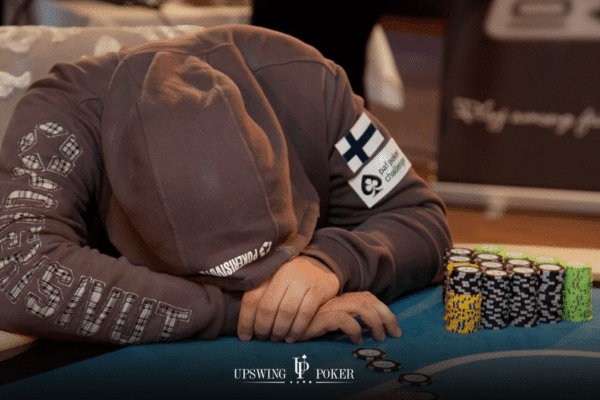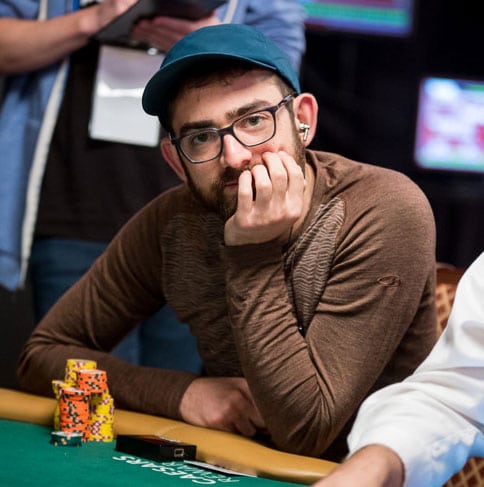
How to Avoid the Unhealthy Mindset That Tortures Poker Players
If you want longevity in poker, you need to have a strong mental game.
Among other things, that means you have to be able to self-criticize (so you can grow as a player) while not self-shaming.
Way too many poker players are extremely harsh and critical of themselves. Such a mindset may help in achieving short-term goals, but in the long-term it puts you in an unhealthy mindset and undermines your chances for sustained excellence.
The video above is from the Professional Fundamentals section of the Advanced PLO Mastery course, which hones in on the mental and emotional focus needed to succeed in poker. We’re releasing it for free today to help players improve their mental strength in these trying times.
Pot Limit Omaha pro Dylan Weisman goes over several major mental game points in the video. Three of those points are recapped below.
This article will take just a few minutes to read, but it will pay dividends every time you sit at a poker table. Let’s begin.
1. You Can be Critical of Yourself Without Being Mean
Even the most seasoned of poker pros go on tilt sometimes, and it usually stems from being upset at themselves for making a mistake.
Many poker players are overly critical of themselves. Dylan says that while being overly self-critical can be a motivator for short-term improvement, it is an unsustainable mindset in the long-run.
I think that you can be critical of yourself without being mean to yourself.
It’s especially important to keep a healthy mindset toward self-criticism in game. If you’re too hard on yourself while playing, your mistakes may become progressively worse.

Dylan Weisman in the 25k PLO Championship at the WSOP
2. Your Language is Powerful
There is a huge difference between admitting you made a mistake and shaming yourself for a mistake.
The way that you talk to yourself is a powerful tool. Dylan’s approach to self-criticism eliminates the use of “I” language when self-critiquing.
Here is an example of a healthy self-critique: “That hand combination was probably a bit too wide there.”
Compare that to unhealthy self-criticism like this: “I really f***ed that spot up by using that combination.”
On that unhealthy type of self-critisism, Dylan says:
That language is toxic because it’s creating a feedback loop that you are the mistake. That you are what is wrong.
While self-criticism is an essential part of improvement in poker, it’s crucial to not self-shame while doing so.
3. Awareness Leads to Change in Process and Thinking
If you find yourself making a mistake and shaming yourself, it is important to learn to recognize that by the language you use to talk to yourself.
One of the most important aspects of healthy self-criticism is the awareness to recognize toxic, overly harsh language toward yourself. Shaming yourself for making a poker mistake can lead to a vicious cycle of shaming, tilt and sub-optimal play.
Once you can recognize self-shaming, you can learn to forgive yourself and move on. If you’re in the middle of a session and can’t forgive yourself for making a mistake, the probability of your play becoming worse goes up exponentially.
In addition to using this approach toward poker, Dylan advocates to use poker as a tool to work on self-love and compassion in other areas of life.
Final Thoughts
Dylan advocates that an integrated, healthy approach to both poker and life in general are essential to long-term poker success. He brings that holistic approach to the table during his $25,000 Challenge Twitch streams and to the Advanced PLO Mastery course.
While most of the course covers advanced PLO strategies, the Professional Fundamentals section focuses on this crucial emotional and mental aspect of a winning poker approach. The course includes:
- 36 hours of PLO training videos from Dylan and high stakes PLO boss Chris Wehner.
- 21 quizzes to cement your understanding.
- Access to the private PLO Mastery group.
If you want to take your PLO skills to the highest level with Upswing’s best-reviewed course yet, join Advanced PLO Mastery.

To learn more for free, check out Chris and Dylan’s free strategy series. Part 1 is 5 Preflop Mistakes You Are Probably Making in Pot Limit Omaha, and it’s a must-see for anyone who plays PLO.